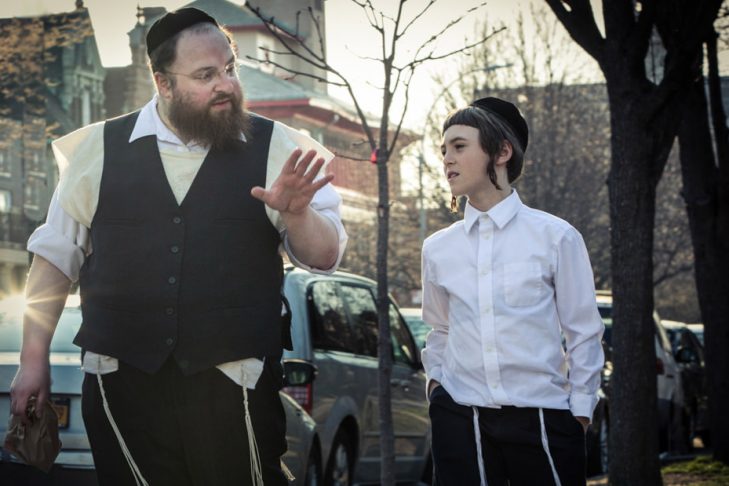“Menashe” is a film filled with a poignancy that will both break your heart and fill you with awe. A breakout among the independent films at this year’s Sundance Film Festival, it also takes its rightful place in the history of Yiddish cinema—a history that goes back to the early 20th century. “Menashe,” which is loosely based on the life of its star, Menashe Lustig, parts a curtain to reveal the segregated, even mysterious, lives of Skver Hasidim residing in Brooklyn’s Borough Park.
It’s also a hybrid of a film—part fiction and part documentary—immersing itself in a culture that is very much a closed society. The fact that the film is shot in Yiddish and the actors are non-professionals is not just a novelty, but is also a miracle of logistics. Hasidic men do not go to movies, let alone appear in them. Nor do they interact, as they do in this film, with women who are not close relatives. Director Joshua Z. Weinstein—who previously directed documentaries that have profiled everything from celebrities to dwellers in the slums of Delhi—has said in interviews that he worked hard to gain the confidence of the community and was advised by consultants like the writer Shulem Deen, a former Skver Hasid.
The film centers on Menashe, a widower in his late 30s trying to regain custody of his 10-year-old son, Rieven, superbly played by Ruben Niborski. He’s lost his son to the norms of the community that dictate a child must be brought up in a two-parent household, specifically with a mother and father. Rieven is placed in the home of his uncle, a successful yet haughty man who looks down on his brother-in-law, Menashe, a humble grocery clerk.
As the first anniversary of the death of Menashe’s late wife approaches, the community’s rabbi gives him a temporary reprieve to spend a week with his son. It’s a bittersweet seven days in which Rieven, whom Menashe refers to as “my only consolation,” is alternately embarrassed by his father and thrilled to be reunited with him. Like any child, Rieven doesn’t want his father to stand out. In this case, he wishes Menashe would wear a formal Hasidic hat and coat on weekdays, rather than his simple black vest over a yellowing white shirt and heavy woolen tzitzit. Yet he loves that his father feeds him a breakfast of cake and soda and buys him a baby chick to fuss over.
Menashe appears to be a true-to-form schlimazel. His luck, if he ever had any, ran out a long time ago. He’s perennially late for his job, where his much younger boss constantly berates him. He’s always short on money and is accident-prone. His late wife’s family is hostile to him. They still hold him accountable for their sister’s death. Life, though, is not what it appears to be. It’s apparent that in a community that prizes large families, Menashe’s wife had trouble conceiving and only gave birth to one child. But infertility did not strain the marriage. In a revealing scene, Menashe confesses that he and his late wife were incompatible, and relates, albeit with much guilt, that he was relieved when she died of a blood clot after undergoing in-vitro fertilization. His feelings about marriage are crystal clear when he tells a potential wife that he is wary of marrying again. His hesitation not only upsets the status quo in his community, but also exposes the dark side of what happens when a village intrudes, rather than supports, the raising of a child.
Lustig and Niborski create their own intimate village onscreen, playing off each other beautifully. During the week the father and son are together, Menashe’s slapdash parenting is just one call away from social services. But within that chaos a kind of naturalism unfolds. The pair argues and goes through a daily life together that is alternately awkward and graceful. Weinstein is not asking his viewers to like Menashe. At times you feel like shaking him until he comes to understand how frequently he messes up when he bails on a loan or miscalculates another school drop-off. But then a few minutes later, all is forgiven and you want to hug this bear of a man.
A deep authenticity runs through the film, which results in a compelling study of character and faith and love. As Weinstein said in a recent interview: “To me, the film is about a man overcoming his grief and coming to terms with himself, with the sadness in his life. This is not a Jewish film. It’s a film about Jews.” Its greatness lies in the way it depicts the soul of a man who fails more often than not, yet time after time gets up and dusts himself off.
Join the Boston Jewish Film Festival for a free preview screening of “Menashe” on Tuesday, Aug. 15, at 7 p.m. at West Newton Cinema. The film opens on Friday, Aug. 18.



